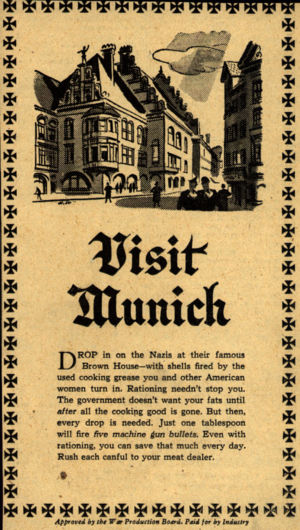Talk:World War II, Homefront, U.S.: Difference between revisions
imported>Subpagination Bot m (Add {{subpages}} and remove checklist (details)) |
imported>Howard C. Berkowitz (→Moving forward: new section) |
||
| Line 12: | Line 12: | ||
:::Richard, thanks for the link to the Powerpoint -- most impressive! My personal favorite was "You Can't Ration Love". There's a rich array of material to choose from, enough to support this and other future entries on this era, and all the goverment-produced stuff is, I believe, copyright-free! [[User:Russell Potter|Russell Potter]] 07:08, 6 June 2007 (CDT) | :::Richard, thanks for the link to the Powerpoint -- most impressive! My personal favorite was "You Can't Ration Love". There's a rich array of material to choose from, enough to support this and other future entries on this era, and all the goverment-produced stuff is, I believe, copyright-free! [[User:Russell Potter|Russell Potter]] 07:08, 6 June 2007 (CDT) | ||
== Moving forward == | |||
The title issues: commas, and what to call the war, remain. | |||
With a first reading, I wonder if the order is correct. Aren't the population attitudes, and indeed the means of influencing them, more important than the economic models? In the society being examined, voluntary cooperation would need to be in place before the rationing would be supported. [[User:Howard C. Berkowitz|Howard C. Berkowitz]] 17:19, 21 June 2010 (UTC) | |||
Revision as of 11:19, 21 June 2010
Illustrations
This is a great article. I thought we might want to have some period illustrations -- ration books (I have my wife's grandfather's), posters, or wartime propaganda aimed at the home front. Here is one example which might be great to have:
There are a few others like this -- including one, rather disturbing, hailing grease as "rat poison" against the Japanese "rat" -- at the Ad Access site at Duke University.Russell Potter 22:13, 5 June 2007 (CDT)
- I agree that posters are great. See D'Ann Campbell's [my spouse!] powerpoint lecture using WW2 posters at [1] CZ is college level and we can and should handle strong stuff--as Dower points out re ww2 in pacific, US and Japan both used nasty images. Richard Jensen 23:22, 5 June 2007 (CDT)
- Richard, thanks for the link to the Powerpoint -- most impressive! My personal favorite was "You Can't Ration Love". There's a rich array of material to choose from, enough to support this and other future entries on this era, and all the goverment-produced stuff is, I believe, copyright-free! Russell Potter 07:08, 6 June 2007 (CDT)
Moving forward
The title issues: commas, and what to call the war, remain.
With a first reading, I wonder if the order is correct. Aren't the population attitudes, and indeed the means of influencing them, more important than the economic models? In the society being examined, voluntary cooperation would need to be in place before the rationing would be supported. Howard C. Berkowitz 17:19, 21 June 2010 (UTC)
